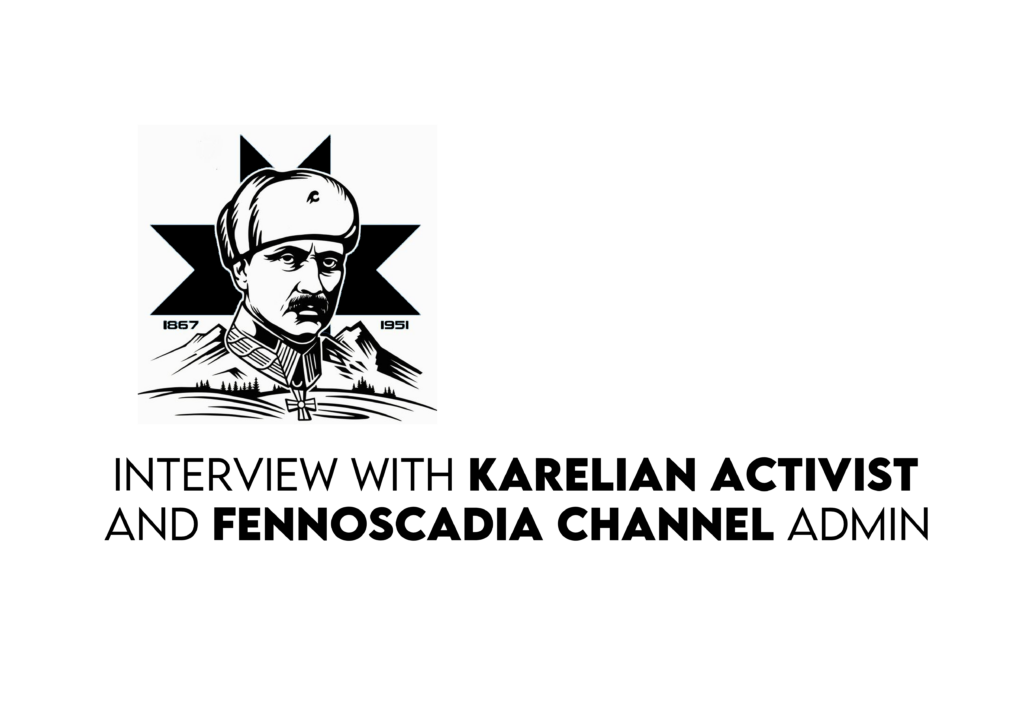Interview with Karelian activist and Fennoscadia admin

1. Salute! In the beginning: please introduce yourself a bit to our readers. Please tell us who you are, where were you born, what are your political views and how your adventure with political activism started?
Witaj! I am a representative of the Karelian independence movement from Moscow. I have a degree in International Relations with a focus on Northern Europe, and a second degree in Bioecology. I was born in the Far North of Russia, on the Kola Peninsula, an area where anti-Soviet activists were exiled and military bases were established. As for my ethnic background, I have Ukrainian Swedes (a small group of Swedes in Ukraine, residing in the Kherson region) in my ancestry, as well as Finnish peoples, and I identify myself as a Pomor. According to DNA research, my distant ancestors were the Vikings who settled in the territory of Rus and built Old Ladoga. My political views can be described as right-wing meritocracy, meaning I am attracted to aristocratic traditionalism and the Platonic idea of „The Republic” – meritocracy as seen in Singapore. I also strongly believe in the biological definition of ethnicity and advocate for the cooperation of complementary biotypes. Initially, at the age of 14, I started as a national-socialist Strasserist, but with each passing year, I drifted towards the right and realized that Marshal Carl Gustaf Emil Mannerheim was the most outstanding historical figure for me, along with the idea of ethno-regionalism. Another important aspect of my political interests, given my background in natural sciences, is green politics within the right-wing discourse.
2. You told us that you are part of Kareli folk. We will come back to this topic later, but tell us what influence has this fact on your life and how you are preceive your Karelian identity.
It is fair to say that I represent the Pomor people. In Karelia, there are several indigenous peoples: Karelians, Veps, Pomors, Sami, and Kola Norwegians. I am more interested in promoting the Scandinavian ethnocultural sphere, but I am also fascinated by the ethnoculture of the Finnish peoples. Living in the Russian Federation, regional-ethnic identity is a part of the existential perception of the world that helps draw a demarcation line from the mainstream of Putinist patriots. There are „us” and there are „them.” We are the descendants of the White Guard and anti-Soviet underground activists, while they are the continuators of neo-Bolshevism and Eurasianism. We are the heirs of the Novgorod veche tradition of the Varangians, and they are the Muscovites who view everything through the prism of a multicultural society.
3. As we understood correctly: you were born and raised in Russia. What can you tell us about this period in your life?
I was very fortunate that my parents were not tainted by the Soviet past (military, Komsomol, party, etc.). In the 1990s, I lived in various regions from the Far North to the Urals. In the 2000s, I attended a very good school with an in-depth study of English, and my parents tried to take me to Europe, especially Finland, so that I would have a broad worldview. Until the events of 2012, I enjoyed a normal life, dreaming that the authorities could be changed. But times changed, and 2014 completely divided the right-wing youth. At that time, I was a member of Votanjugend and entered the university, where, together with my comrades, I pledged to conduct underground resistance against the neo-Soviet regime, as our ancestors did. It was at the university that I first faced pressure from the security services for actively supporting Ukraine, and they even threatened to expel me if I became too active. Around this time, I shifted my focus to studying the history of Vikings in the territory of Russia in order to promote Nordic traditionalism through soft power.
4. How you would describe Russian Federation as a country and society (based on your own experience)? Could you tell us how this country looks like from your own perspective and from „inside”?
The Russian Federation is de facto and de jure the successor of the Soviet Union. The only difference from the USSR is that now a religious factor has been added. Perhaps the most suitable term for Russia is national Bolshevism. However, it is a nationalism of Eurasian origin, as conceived by Limonov and Dugin (and I studied their works even at the university). In Russia, there are showcase cities like St. Petersburg, Sochi, Kazan, Petrozavodsk, Arkhangelsk, Vladivostok, often located near the borders where tourists from other countries can reach. Everything there is relatively average, creating only a general impression of the country. However, the majority of the country seems to be living in the 19th century in terms of infrastructure. The only difference is Moscow, where all the taxes from all territories are collected. This is a tradition rooted in the Mongol and Byzantine past. Speaking of the European peoples of Russia, especially the Finns, Baltics, Scandinavians, and Slavs, they are constantly being shown that they are not Europeans. National languages are being abolished in schools, and the indigenous population is gradually being replaced by migrants from Central Asia. This is done to revive the USSR in consciousness and on the map.
5. As we know: you are abroad on forced, political emmigration. Could you tell us something more about this situation? Why you was forced to make such decision? What influence it has on your life?
Yes, I am currently in Northern Europe. I am in a country where the White Army emerged victorious. I spoke at a forum in Gdansk about the decolonization of Russia, and then I attended a forum of Finnish peoples in Estonia. During this time, I received a letter from the FSB (Federal Security Service) notifying me that I was wanted, so I had to stay in Europe. It was not something I had planned, so I am starting my life from scratch, but I continue the struggle. They persecuted my ancestors, and now history is repeating itself. Keeping in mind the experiences of my relatives, I have decided not to return to Russia.
6. Do you break up all ties with Russia because of this situation? Or maybe your are still trying to have some impact on situation in the country in the framework of opposition activity?
I have several media resources that have already been blocked by the security services in Russia. Currently, I am actively trying to convey information about the ethno-cultural revival of Karelia, Scandinavian and Finnish peoples, as well as about politically persecuted activists during the Soviet and Putin eras. I also strive to provide informational support to Karelian opposition members who have gone to fight in Ukraine on the side of the Armed Forces of Ukraine.
7. As you know this country very well: if current invasion of Russian on Ukraine was surprise for you? Do you have any specific memories in connection with this event?
While studying at the university, I understood that a military confrontation was possible, but I didn’t think it would be so overt. I thought the neo-Bolsheviks would act as proxy forces, but they launched a full-scale frontal attack. This was significant for me because my relatives live in Kyiv and they are being subjected to air raids by Putin’s henchmen.
8. Please tell us more about Karelians: their history, origin, habits and how they are different from other people in the Russian Federation.
It is worth mentioning that the Karelians, along with the Veps and Sami people, have always had close contacts with Northern Europe. They had their own principality, with strong ties to the Finnish and later Swedish Vikings. Later, Karelia became part of the Novgorod Republic, and this alliance of northern peoples fought against Muscovy. By this time, Swedish and Norwegian Viking settlers had already appeared in the region. The trade route from the Varangians to the Greeks passed through the territory of Karelia. After the fall of the Novgorod Republic, many Novgorodians fled to Northern Karelia, where a new ethnic group called the Pomors emerged (Baltic-Slavic + Finno-Scandinavians). Genetically and anthropologically, Karelia differs from the rest of Russia. This is also noticeable in the mental aspect. During the Russian Civil War, the peoples of Karelia supported the Finnish White Guard and even resisted the Red Army until 1923, declaring independence. Furthermore, the first Gulag camps were built in Karelia. During World War II, the Karelian peoples and anti-Soviet special settlers supported Carl Gustaf Emil Mannerheim in his struggle against Bolshevism. Until 1956, Karelia was a union republic, alongside Estonia and Ukraine. However, since the Karelians used the Latin script and had strong ties with Northern Europe, the Soviet leadership feared separatism and revoked the republic’s status. During the perestroika period, Karelia sought independence, but its national revival was restricted due to the war in Chechnya. For example, in 1994, a Veps national autonomy was established, but it was closed in 2004. The Republic abolished the study of the national language in universities and restricted its teaching in schools.
9. How Russian invasion on Ukraine affected on the life of Karels in the Russia? How Putin’s regime treats Karelians in general?
The events of 2014-2022 had a profound impact on the population of Karelia, as there are a significant number of Ukrainian immigrants in the republic. In the 1930s-1950s, they were forcibly relocated here by Stalin, and now their relatives are being targeted by Putin. The tragedies of 1939 and 2022 have merged together for the population of Karelia. It is the most European republic in Russia, with a population that has the most pronounced Northern European ethnocultural tradition. As a result, the control over national activists in Karelia has significantly intensified after the war.
10. How Karelians’ community in the Russian Federation is built? Do they have any kind of cultural organization/own schools/or impact on political life in Russia?
Yes, they exist, but they are all under the control of Russian intelligence agencies. All genuine Karelian organizations are based in Finland, some are in Estonia. As for Pomor organizations, they are located in Norway.
11. How do you see the future of Karelian folk? Do they have any future in the Intermarium project in your opinion? How war in Ukraine can affect on your cause?
I believe that the war in Ukraine provides an opportunity for Karelia to gain independence. It is no coincidence that the main hero of Ukraine, Azov Commander Denis Prokopenko, has Karelian roots, and his great-grandfather took part in the war for Karelian independence. We believe that we can present the „Karelianization” project to the Intermarium, that is, to become a shield and buffer for Northern Europe and the Baltic states. We are also ready to become a gathering point for all Finnish and Scandinavian peoples, as well as European descendants of the anti-Soviet and anti-Putin struggle. We draw on Finland’s experience, and currently Karelian nationalists are taking up arms as part of the Armed Forces of Ukraine, with many of them having been fighting there since 2014.
12. Tradition of our portal is that last words belong to you:
Thank you to Poland for setting an example in preserving European traditions! Thank you to Ukraine for their assistance in our common struggle! Thank you to Finland, Estonia, Sweden, and Norway for becoming new homes for Karelian activists in the past and present.
Glory to Ukraine! Glory to the Karelian nation! And an end to the Russian Federation!
You can find Fennoscadia channel here: https://t.me/Fennoscandia


